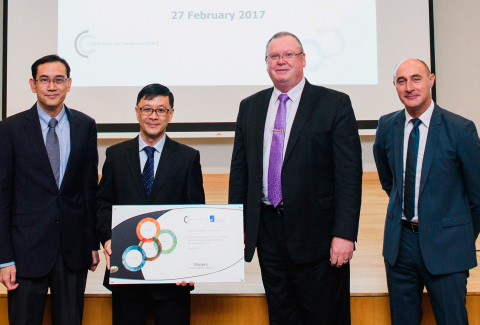MILFORD, Mass.--(BUSINESS WIRE)--At a ceremony and symposium today, Waters Corporation (NYSE:WAT) welcomed into its Centers of Innovation Program the Bioprocessing Technology Institute (BTI), a research institute under Singapore’s Agency for Science, Technology and Research (A*STAR). BTI is the first research institute1 focused on glycobiology to participate in the Waters Centers of Innovation Program.
Glycans, or sugars, are one of the four fundamental classes of macromolecules that comprise living systems. BTI’s glycan research is aimed at finding novel cancer markers and elucidating glycosylation pathways that could pave the way for new therapeutic strategies.
“I am delighted that BTI has been recognised by Waters for its expertise in glycomics. Through this collaboration, BTI will be able to advance cancer biomarker research and further cement Singapore’s position as a key player in biologics,” said Professor Lam Kong-Peng, Executive Director of BTI.
“This award also recognizes the importance of the integrated research programmes that are fundamental to the success of BTI,” added Professor Lam.
“It’s truly a pleasure to have BTI participate in our COI Program,” said Dr. Mike Harrington, Senior Vice President, Global Markets for Waters Corporation. “BTI’s research in glycobiology is world-class and we wish to help it realize the enormous potential of this very important area of science through the application of Waters analytical technologies and expertise.”
In connection with today’s announcement, Waters Corporation is supporting The Next Frontier of Glycobiologics, a symposium featuring keynote presentations from Professor Raymond Dwek, Glycobiology Institute, University of Oxford, United Kingdom and from Professor Nico Callewaert, VIB Medical Biotechnology Center, University of Ghent, Belgium.
In 2016, Waters and BTI announced a collaboration to develop a glycoconjugate database and spectral library that would assist researchers using mass spectrometry in identifying glycans in their samples. As part of this collaboration, Waters is contributing scientific expertise and the use of a Waters® SYNAPT® G2-S High Definition Mass Spectrometry® System. The instrument features ion mobility mass spectrometry technology that rapidly separates molecular ions by not only their size and mass-to-charge ratio, but by their shape. It also calculates a collisional cross-section (CCS) value for each molecular ion. The ability to identify glycans based on their CCS value reveals insights into their unique chemical structure that provides a higher degree of specificity than using just mass-to-charge ratio alone.
The glycoscience programme, headed by Professor Pauline Rudd and Dr. Terry Nguyen-Khuong, Scientist of BTI, will further develop and apply state-of-the-art technology to advanced bioprocessing and biologic characterization, development and production.
The Importance of Glycans and the Need for Better Measurement Tools
Glycan research, like that being done at BTI, may promise to lead to better understanding of diseases such as cardiovascular, neurological, infectious, metabolic diseases and cancer through the identification of disease biomarkers.
Opportunities in glycosciences have been assessed by committees of scientists convened in the EU and US. In 2012 the U.S. National Academy of Sciences released a report on glycoscience, its potential and impediments to its progress. The report titled Transforming Glycoscience: A Roadmap for the Future2 acknowledged that glycoscience “is essential for understanding biology” and pointed to the need for “tools to probe their often complex structures and properties.” The report went on to state, “A suite of tools analogous to those available for studying nucleic acids and proteins is needed to detect, describe, and purify glycans from natural sources, and characterize their chemical composition and structure. The development of (such) tools for the detection, imaging, separation, and high-resolution structure determination of carbohydrate structures and complex mixtures should be a high priority for the National Institutes of Health, the National Science Foundation, the Department of Energy, and the Food and Drug Administration, and other relevant stakeholders.”
The report further stated the need for a glycan structure database for understanding the structures and functions of glycans and highlighted the role of liquid chromatography, mass spectrometry and NMR measurements for obtaining detailed structural information of glycoconjugates, whether from a cell membrane or from a biopharmaceutical.
About the A*STAR’s Bioprocessing Technology Institute (BTI)
Bioprocessing Technology Institute (BTI) is a member of the Agency for Science, Technology and Research (A*STAR). Established in 1990 as the Bioprocessing Technology Unit, it was renamed the Bioprocessing Technology Institute (BTI) in 2003. The research institute’s mission is to develop manpower capabilities and establish cutting-edge technologies relevant to the bioprocessing community. Some of the key research areas include expression engineering, animal cell technology, stem cell research, microbial fermentation, downstream purification and analytics.
For more information on BTI, please visit https://www.a-star.edu.sg/bti/
About Waters Corporation (www.waters.com)
Waters Corporation (NYSE:WAT) develops and manufactures advanced analytical and material science technologies for laboratory dependent organizations. For more than 50 years, the company has pioneered a connected portfolio of separations science, laboratory information management, mass spectrometry and thermal analysis systems.
Waters, SYNAPT and High Definition Mass Spectrometry are trademarks of Waters Corporation.
1. BTI is the second institution from Singapore to be recognized by Waters Centers of Innovation Program. In 2011, the National University of Singapore and Assistant Professor Ganesh Anand became COI participants on the basis of their research into viral malaria and dengue fever.
2. Transforming Glycoscience: A Roadmap for the Future, National Academy of Sciences, The National Academies Press, Washington, D.C., 2012 http://dels.nas.edu/Report/Transforming-Glycoscience-Roadmap/13446




